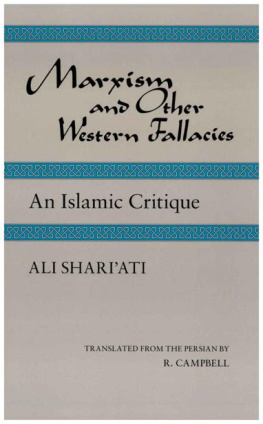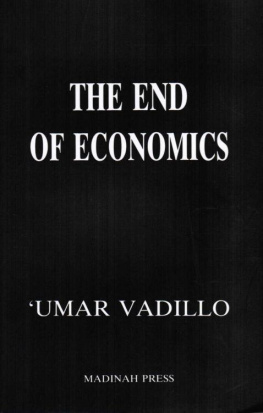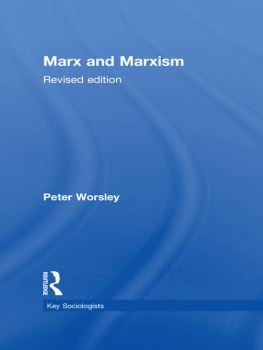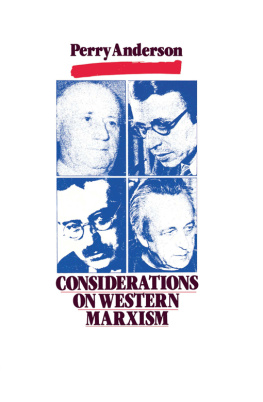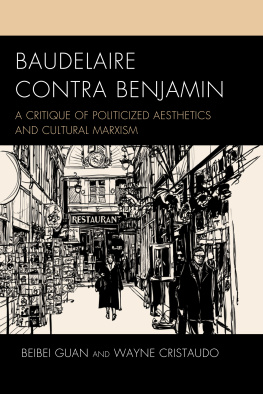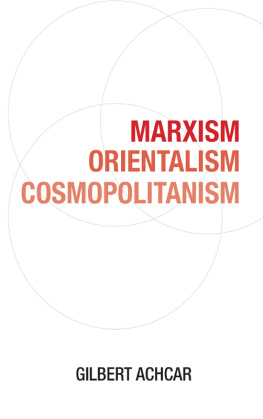Ali Shariati - Marxism and Other Western Fallacies: An Islamic Critique
Here you can read online Ali Shariati - Marxism and Other Western Fallacies: An Islamic Critique full text of the book (entire story) in english for free. Download pdf and epub, get meaning, cover and reviews about this ebook. year: 2015, publisher: BookBaby, genre: Science. Description of the work, (preface) as well as reviews are available. Best literature library LitArk.com created for fans of good reading and offers a wide selection of genres:
Romance novel
Science fiction
Adventure
Detective
Science
History
Home and family
Prose
Art
Politics
Computer
Non-fiction
Religion
Business
Children
Humor
Choose a favorite category and find really read worthwhile books. Enjoy immersion in the world of imagination, feel the emotions of the characters or learn something new for yourself, make an fascinating discovery.
- Book:Marxism and Other Western Fallacies: An Islamic Critique
- Author:
- Publisher:BookBaby
- Genre:
- Year:2015
- Rating:4 / 5
- Favourites:Add to favourites
- Your mark:
- 80
- 1
- 2
- 3
- 4
- 5
Marxism and Other Western Fallacies: An Islamic Critique: summary, description and annotation
We offer to read an annotation, description, summary or preface (depends on what the author of the book "Marxism and Other Western Fallacies: An Islamic Critique" wrote himself). If you haven't found the necessary information about the book — write in the comments, we will try to find it.
Marxism and Other Western Fallacies: An Islamic Critique — read online for free the complete book (whole text) full work
Below is the text of the book, divided by pages. System saving the place of the last page read, allows you to conveniently read the book "Marxism and Other Western Fallacies: An Islamic Critique" online for free, without having to search again every time where you left off. Put a bookmark, and you can go to the page where you finished reading at any time.
Font size:
Interval:
Bookmark:


 | MIZAN PRESS 5 Sicomac Road, Suite 302 North Haledon, NJ 07508 www.islamipub.com U.K. & Europe: www.ipimizan.co.uk |
Copyright 1980 by Mizan Press
Printed in the United States of America
All rights reserved under international and Pan-American Copyright Conventions. No part of this publication may be reproduced in any form, or by any means electronic or mechanical, including photocopy, recording or any information storage retrieval system, now known or to be invented without the written permission of the publisher
Director of Publications: Moin Shaikh
Library of Congress Cataloging in Publication Data
Shariati, Ali.
Marxism and other Western fallacies.
(Contemporary Islamic thought: Persian series)
Based on the authors Insan, Islam va maktabha-yi Magrib zamin.
1. Islam20th century. I. Title. II. Series.
BP163.S516 297.2 79-29729
ISBN 978-0-933782-06-8 hard cover
ISBN 978-0-933782-05-1 paperback
ISBN: 9781483555515
Contents
Preface
T HIS IS A BOOK that speaks for itself too eloquently to need a lengthy and laudatory introduction. The appreciation of its intrinsic interest may, however, be enhanced by an awareness of the political and intellectual context in which it was producedthat of Islamic Iran moving inexorably forward to the heroic destruction of one of the most hideous tyrannies of modern times and the immense task of creating a new state, society, economy, and culture.
Among the architects of this movement, the most important is indisputably Imam Khomeini himself, who in rare, almost unique fashion has come not only to exercise political and religious leadership, but also to be the symbol of Iranian nationhood and, beyond that, a precious exemplar of the human ideal of Islam. But other than Imam Khomeini, no one has had a more penetrating influence than the writer of this work, the late Ali Shariati. We will not repeat here the detailed and analytical biography of Shariati that has been published elsewhere, but instead draw attention to the amplitude and depth of his posthumous influence on the Iranian revolution.
In all the diverse speeches, lectures and writings of Shariati, there is barely a single reference to the political, economic and other miseries of Pahlavi Iran, and yet it is necessary now to designate him as the chief ideologue of the Iranian Islamic revolution. His lectures at the Husayniya-yi Irshad in Tehran and in other forums around Iran (the texts of which were generally recorded, transcribed, and disseminated throughout the country) awakened new interest and confidence in Islam, not merely as a private form of worship, but as a total world-view (jahanbini, one of his favorite terms), fully autonomous, superior to the creeds and ideologies of past and present, and bearing in its heart a revolutionary mission. A large number of the secularly educated intelligentsia who had become alienated from Islamand thereby from their society and the masses of the Iranian nationwere drawn again to Islam as the pivotal point of both personal existence and national destiny by the eloquence, range, and originality of Shariatis thought. He had a style unique among modern Muslim thinkers. He had mastered (in every sense of the word) the intellectual legacy and actuality of the West, and, eschewing apologetics, superficial modernism, and the mechanical coupling of the best of both worlds, he was able to set against it a coherent, fresh, and powerful vision of the spiritual and philosophical essence of Islam, a vision that millions of Iranians found inspiring and convincing. Further, Shariati endowed the discussion of religious topics in Iran with a new tone of thought, a new style of discourse, and a whole set of new terms. This, indeed, was a revolutionary achievement.
This achievement bore fruit in the twelve months of intensified struggle, beginning in January 1978, that led to the overthrow of the Pahlavi dynasty and the birth of the Islamic Republic of Iran. As the mosques of Iran became the ideological and organizational centers of the revolution, echoes from the work and ideas of Ali Shariati could be heard in many of the sermons and addresses that inspired the Iranian Muslim people to seek martyrdom. Memorable sentences from his writings served as ready-made revolutionary slogans, without need for any elaboration or commentary, and they were inscribed on banners carried in all of the great demonstrations of the Iranian revolution: The martyr is the heart of history! Every day is Ashura; every place is Karbala! Most importantly, many of those who with their blood bought the foundation of the Islamic Republic in this world, and Paradise in the hereafter, were, directly or indirectly, the pupils of Shariati.

On April 23, 1979, a terrorist group by the name of Forqan assassinated General Muhammad Vali Qarani, first chief of staff of the Iranian armed forces after the revolution. This was followed on May 1 by the murder of Ayatullah Murtaza Mutahhari, a close associate of Imam Khomeini, and three weeks later by an attempt on the life of Ayatullah Hashimi Rafsinjani; Forqan also claimed responsibility for those crimes. In a communique forwarded to the Tehran newspaper Ayandeganalways eager to print such material, before it was closed down by the revolutionary prosecutorthe anonymous hands of Forqan wrote that they were in the service of the thought of Shariati and attempting to realize his alleged vision of an Islam without akhunds, i.e., institutionalized religious leadership.
It is highly probable that Forqan is ultimately under the command of persons owing their allegiance to the former regime, and possibly, also, to the American patrons of that discredited tyranny. Certainly American officialdom has begun showing a remarkable interest in the work of Shariati. For example, in January, the State Department began making inquiries concerning his thought and influence, and three months later, attempts were made to recruit someone to brief Cutler, then ambassador-designate to Iran, on the same subject. Once the activities of Forqan are considered in the context of continual imperialist activity to destabilize the Islamic Republic of Iran, they appear as a tactic designed to create a dichotomy in the Islamic movement: on the one side, the posthumous following of Shariati, anti-clerical in its attitudes, and opposing them, those loyal to the religious leadership, above all Imam Khomeini.
Given this probable counterrevolutionary direction of the activities of Forqan, it may be conceded that some of the followers of the movementthose entrusted with the business of killinggenuinely believe in the necessity for eradicating the ulama. All too numerous in Iran are young people whose acquaintance with Islam is recent and superficial, and for whom Islam means, above all, a permanent and unbridled revolutionary fervor. As the late Ayatullah Mutahhari pointed out, hypocrites always need fools to carry out their plans, and it is likely that Forqan is indeed an alliance of scheming hypocrites and gullible fools. The most effective way to recruit the fools, it appears, has been to invoke Shariati as the alleged ideologue of anti-clerical Islam.
Because certain pseudo-academic authorities have attempted to legitimize this claim of Forqan to the legacy of Shariati we would like to clarify here the attitudes that Shariati did in fact hold toward the
Next pageFont size:
Interval:
Bookmark:
Similar books «Marxism and Other Western Fallacies: An Islamic Critique»
Look at similar books to Marxism and Other Western Fallacies: An Islamic Critique. We have selected literature similar in name and meaning in the hope of providing readers with more options to find new, interesting, not yet read works.
Discussion, reviews of the book Marxism and Other Western Fallacies: An Islamic Critique and just readers' own opinions. Leave your comments, write what you think about the work, its meaning or the main characters. Specify what exactly you liked and what you didn't like, and why you think so.

